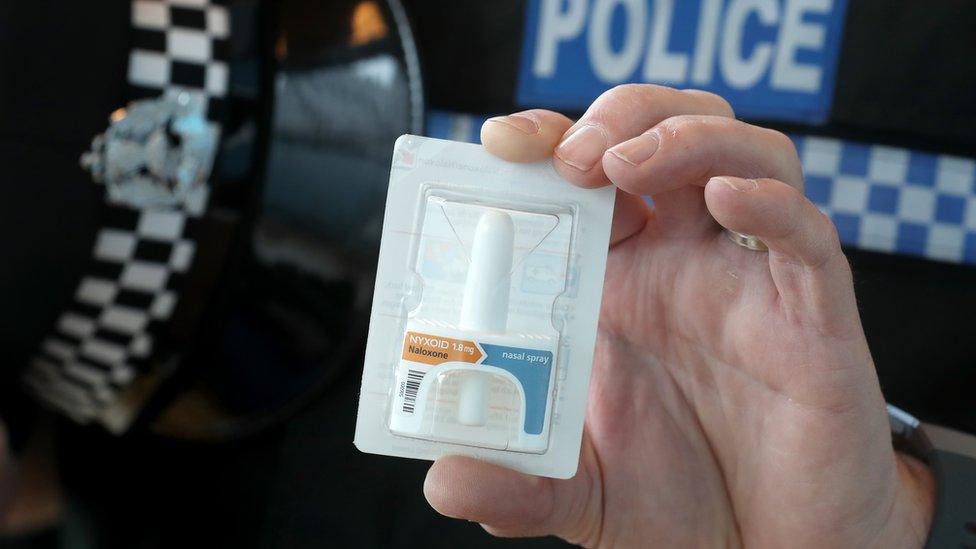Police Scotland officers to be issued with Naloxone overdose spray
- Published

The emergency treatment comes in the form of a nasal spray
All police officers in Scotland are to be issued with an emergency treatment for drug overdoses.
The national roll-out of the Naloxone nasal spray follows pilots in Dundee, Falkirk, Glasgow, Stirling and Caithness.
Police Scotland said the spray, which counters the effects of opioids overdoses, was used 51 times during the trial to provide first aid.
The move was recommended by a study led by Edinburgh Napier University.
Researchers called for Naloxone training to be made compulsory for all Police Scotland officers and staff, following an evaluation of the pilot last year.
The Naloxone spray has also been used since the trial ended and has now been administered by officers on 62 occasions, according to Police Scotland.
Chief Constable Iain Livingstone said the force was committed to reducing the "terrible toll" of drug deaths in Scotland.
"We have a vital role in preventing drugs from reaching our streets and bringing those engaged in serious and organised crime to justice, and that will always be a key duty and priority for Police Scotland," he said.
"Preservation of life, keeping people save, lies right at the heart of policing. We have a purpose and remit which goes beyond law enforcement."
The chief constable added that training and equipping officers with Naloxone would contribute to Police Scotland's mission to "improve the lives of our communities".
During the trial between March and October last year, 808 officers were trained to use Naloxone and 656 volunteered to carry the nasal spray kits.
Police Scotland said 12,000 officers across the country would now be issued with the emergency treatment.

'It's as close to miraculous as you can imagine'
Community Officer Ross Hunter says it was "close to miraculous" seeing the man who had overdosed coming back to life
Ross Hunter is a community police officer in Tayside who has used Naloxone on two occasions to treat people suffering from drug overdoses.
He told BBC Scotland the second incident happened in Dundee when he was patrolling an area where drug use is common.
"We came across a gentleman who appeared to be deceased in a common close. He had no obvious signs of breathing and wasn't responding to any sort of stimulus," he said.
"I administered the first dose of Naloxone at that point and he started breathing. He still wasn't conscious but at least I knew he was alive.
"Within two minutes I administered the second dose and he was able to articulate and he was able to sit up slightly - though he was still clearly under the influence.
"I've never seen anything like it in my life. It's as close to miraculous as you can imagine.
"We had an ambulance on its way. They arrived and took him to hospital."

More than 1,300 people died of drug misuse in Scotland in 2020 - a record number of deaths for the seventh year in a row.
Scotland continues to have the highest drug death rate in Europe.
Prof Nadine Dougall, one of the researchers in the Edinburgh Napier University study, said: "Our evaluation has shown that there is significant potential benefit in training and equipping police officers with Naloxone nasal spray as part of emergency first aid until ambulance support arrives.
"Many police officers told us they are often the first to attend people who have overdosed, and they greatly valued the potential to save lives in this way.
"People with personal experience of overdose also agreed naloxone should be carried by police officers but were keen to stress that naloxone was only a part of a solution to address drug-related deaths."